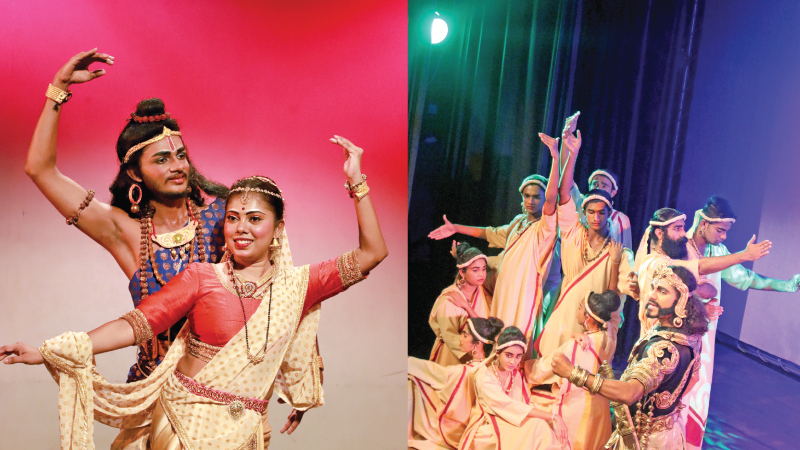I first saw Ravana-Seetabilashaya when it premiered in 2018, and have often thought of it since then, not only because it revolutionises the well-known Indian epic, which it does, but also because I have rarely encountered a piece of stylised drama that echoes the needs of the society we live in today or, as my teenage daughter put it to me on the fourth time we saw it, embodies theatre that has “cool elegance.”
Beginning in the middle of Valmiki’s Ramayana, with the exiled Rama walking in the forest, accompanied by his wife, Sita, this new version is a poignant and uplifting theatre piece about love, leadership and the virtues of the Sinhala king Ravana, hitherto maligned as an unscrupulous demon.
Underlying tragedy
This last feature is the underlying tragedy to which this production is pinned, although it journeys through Suparnika’s tryst with Lakshman, internal conflicts in Ravana’s kingdom as well as a marvelous skit by the monkey king, Hanuman. Conceived by Prof. J.B Disanayaka and Dr. Namel Weeramuni who co-wrote the script, and directed by Dr. Weeramuni, the play trounces the notion that Valmiki’s epic is outdated today or that its interpretative possibilities have already been exhausted.
While Prof. Disanayaka’s masterpiece written when he was still a student, vividly and brilliantly brings to life the well-known story of the Ramayana, Dr. Namel Weeramuni in the last scenes gives a twist to the plot, portraying Ravana, the King of Lanka in a new light and bringing out the best in the blackguarded ‘demon king.’ Evidently, it takes a brave playwright to rework the epic with the audacity Dr. Namel Weeramuni employs. As Dr. Weeramuni said in 2018 when the play was first staged, his version of the Ramayana reveals what Valmiki failed to see.
After a clever prologue of sorts to ensure the audience is aware of the events leading to Rama’s banishment, we see Ravana mesmerised by Sita and inviting her to accompany him to the island of Lanka. Although he promises her a life filled with every luxury imaginable, Sita refuses his proposal resulting in the one act that casts a cloud on Ravana’s character. Back in his kingdom, Ravana continues to court Sita showing her the respect she deserves while Sita staunchly remains faithful to Rama. Not knowing what transpired between his enemy and his wife, Rama, however, is suspicious of Ravana’s conduct which in turn leads to Sita’s decision to prove her chastity.
After Ravana rescues her from the burning fire and in the wake of the ensuing pleas between Rama and Ravana each asking her for her affections, Sita agrees to become Ravana’s wife, but not without one last trial. What she asks of Ravana and whether he compiles in this “new” Ramayana is best left unsaid until the curtains rise at the Punchi Theatre on September 23, 2023.
The performances of the cast with Rajitha Hevathanthrige as Ravana, Dewmini Dodangoda as Sita and Tharanga Hewathondilage as Rama move with intoxicating speed, effectively combining the events in the Indian epic with Akila Palipana’s amazing choreography and the dazzling costumes designed by Jagath Kosmodara and Malini Weeramuni. The most memorable scenes include Ravana’s preparations for battle and Sita’s ride in the legendary aircraft, the dandu monara.
The performances also match the variety and energy of the songs and music. Rajitha invests Ravana with immense authority, reminding us that though banished into the realm of demons in the Indian epic he is in truth a leader of noble character. Dewmini as Sita and Tharanga as Rama, who seem fresh out of drama school, bring to their roles a refreshing, youthful interpretation that effectively contrasts with Ravana’s more experienced and impressive whirlwind moves.
Memorable performance
Another memorable performance comes from Amith Prasad as Hanuman who eases the tension and leaves the audience, simultaneously gaping in fear and overcome with unrestrained laughter. Saman Liyanarachchi as Lakshman, Guvani Uvindya who doubles as Suparnika and a member of the chorus, and Sugath Maithri as Vibhishana are equally impressive in their enactment of mythical characters in ways we do not ordinarily get to experience in stylised drama. No doubt their performances are enhanced by the powerful voices of the three narrators: Mahesh Rajaguru, Nihari Somasiri, Nishantha Ajith Kumara and the chorus: Ravindu Sandaruvan, Akalanka Welagedera, Dasun Niranga, Umayanga,Tharushi Shashini, Chathumini and Supuni.
In the end however, the power of Ravana-Seetabilashaya lies in its ability to show Ravana as a human being no worse, no better than the rest of us out there in the real world. Dr. Weeramuni has created a surreal and ultimately heart-wrenching experience, that at a time of national crisis, celebrates the saga of a benign, considerate ruler. [email protected]






